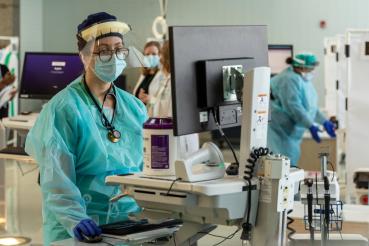When a COVID-19 vaccine becomes available for children — perhaps as soon as Halloween — how will parents know that it's safe?
Before deciding whether to authorize and recommend a COVID-19 vaccine for use in kids, the U.S. Food and Drug Administration and the Centers for Disease Control and Prevention first review extensive data from clinical trials on its safety, says Latania Logan, MD, MSPH, chief of pediatric infectious diseases, hospital epidemiologist and an associate professor of pediatrics at Rush University Medical Center.
“People should know that these trials were designed primarily to ensure that these vaccines are safe in children,” Logan says. Beyond safety, researchers also want to ensure that a vaccine is effective at preventing serious infections and complications from COVID-19.
So far, the news is promising: Pfizer and BioNTech reported positive results from a trial of their vaccine in children ages 5 to 11. Currently, only the Pfizer-BioNTech COVID-19 vaccine is authorized for use in adolescents ages 12 to 15 (the Moderna and Johnson & Johnson vaccines have not yet been authorized for use in this age group).
When a vaccine becomes available for kids ages 5 to 11, Logan won’t hesitate to get her own 7- and 10-year-olds vaccinated. “I can’t wait to see the 5- to 11-year-olds start to come in for their shots,” she says. “Seeing the 12- to 15-year-olds come in for their vaccines was one of the highlights of my year.”
Following are answers to some questions she’s had from parents about the COVID-19 vaccine and children.
Early in the pandemic, children didn’t seem to be as vulnerable to COVID-19. Is that still the case? And if so, why do they need a vaccine?
Compared with adults, fewer children have been infected with COVID-19 overall, and they are less likely to become seriously ill from the virus. However, COVID-19 cases and hospitalizations in children have been on the rise due to the highly transmissible Delta variant and kids returning to their normal routines.
“At the beginning of the pandemic, only 3 percent of cases were occurring in children younger than 18 — now, more than one-quarter of cases are occurring in children,” Logan says. Just in the past four weeks, COVID-19 infections among kids have increased 240%.
Children can also spread the virus to others. That is why researchers are testing the safety and effectiveness of a vaccine in kids younger than 12.
Researchers believe that a COVID-19 shot will help prevent kids from getting seriously ill even if they do get infected with the virus. One concern is multisystem inflammatory system in children, also known as MIS-C, a rare but serious condition associated with COVID-19. Kids who have it may experience inflammation in their heart, lungs, brain, kidneys and other organs.
“When a vaccine is approved in kids, we will want to vaccinate children to protect them from the severe outcomes that can occur from COVID, but also to protect their families and other people who may be unable to get vaccinated or who may not have the appropriate immune response to vaccination and could be hospitalized or die from this illness,” Logan says.
When will a COVID-19 vaccine be available for kids?
A Pfizer/BioNTech COVID-19 vaccine for kids ages 5 to 11 could become available as early as Halloween this year, allowing kids to be fully vaccinated before the winter holidays, Logan says.
For kids under 5, a vaccine could be ready by the end of 2021 or early 2022, she adds.
Will the kids’ vaccine be the same dose that teens and adults get?
Everyone 12 and older currently receives the same dose of the vaccine. But for younger kids ages 5 to 11, Pfizer and BioNTech used a dose that is one-third the dosage of the vaccine given to older people, Logan says. Early results suggest that this lower dose can produce the same immune response in children as the higher dose in adults.
“They went with a lower dose in children ages 5 to 11 because it was both safe and effective, and we also know children have more robust immune systems than adults,” Logan says.
What COVID-19 vaccine side effects can occur in kids?
Typically, young people experience the same temporary side effects of the vaccine that adults do. This includes a sore arm, fatigue and fever. Most of these side effects go away within a few days, Logan says.
What about cases of heart problems developing in kids after the vaccine?
There have been some rare cases of inflammation of the heart muscle and outer lining of the heart, known as myocarditis and myopericarditis, in teens and young adults after getting the mRNA vaccines (Pfizer-BioNTech or Moderna). However, though the data has not published as of yet, Pfizer and BioNTech reported to the media that there were no cases of myocarditis or myopericarditis in kids ages 5 to 11 in their recent clinic trial, Logan says.
Myocarditis and myopericarditis can cause symptoms like chest pain, shortness of breath and a rapid heartbeat that respond well to treatment. “People can feel reassured that among those who do have these rare events, the vast majority of them recover right away with no long-term issues,” Logan says. Because these cases are rare and because the incidence of myocarditis is much higher with actual COVID-19 infection, Logan and organizations like the CDC and FDA believe the benefits of the vaccines outweigh these potential risks.
What kind of impact could a COVID-19 vaccine for kids have on the pandemic?
Logan believes getting younger children vaccinated against COVID-19 could help slow the spread of the virus and help curb the pandemic in the United States.
Currently, the virus is spreading quickly through unvaccinated populations, including young children who are not yet eligible for a vaccine and adults who have chosen not to get the vaccine. A vaccine authorized for children would help prevent kids from spreading the virus to older people and those more vulnerable to serious effects of the virus. “If we can get kids vaccinated, we should be able to protect them from transmitting it to each other, to their younger siblings who can’t get the vaccine yet and to their family members who may be at higher risk for these infections,” she says.
A vaccine for kids could also help the country come closer to reaching herd immunity. “If a vaccine is authorized for 5- to 11-year-olds, another 28 million people will become eligible for the vaccine. That will bring the percentage of the U.S. population that is vaccine-eligible by age from around 85 percent to 94 percent,” she says.
To fight the pandemic on a global scale, however, Logan believes more COVID-19 vaccines need to be made available to the rest of the world.
Will schools be able to mandate COVID-19 vaccines for kids?
In early September, Los Angeles became the first large school district to mandate COVID-19 vaccines for students 12 and older who attend classes in person. Many colleges also require that students are fully vaccinated against COVID-19.
But whether schools across the country are able to mandate COVID-19 vaccines is still unclear. Logan believes the decision to mandate vaccines in children will likely be left to state and local jurisdictions.
Will kids still need to wear masks if they’re fully vaccinated?
Masks will continue to provide an important layer of protection for kids even after they are vaccinated, Logan says.
“Wearing masks is going to be a routine part of life for us for a while,” she says, adding that masks can also help protect kids against viruses like the cold and flu that begin circulating in the fall.
If you or your child (12 and older) has not yet received a COVID-19 vaccine, you can schedule an appointment to get a shot.




